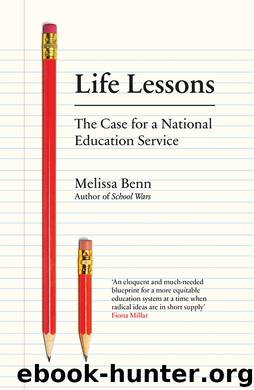Life Lessons by Melissa Benn

Author:Melissa Benn
Language: eng
Format: epub
Publisher: Verso Books
6
Return of the Professional
Today, teaching is no longer a private endeavour that takes place in a classroom. Now teachers are required to create a paper trail that proves learning has happened, for people who were not present in the room at the time … This audit culture means that, in many schools, the teacher no longer is able to decide how to prepare and deliver lessons, mark pupils’ work, and assess and record learning. Rebecca Allen, Caroline Benn memorial lecture, November 2017
There is probably no area of current education policy where successive governments have made such a crass mess of things than in the way we train, treat and reward today’s educators. While we are constantly told that the improvement of our system does not lie in questions of structure or funding but is largely down to the talents and determination of individuals in the classroom or the lecture hall, nonetheless official policy works with equally depressing consistency to undermine the creation of a highly skilled, confident, well-paid and autonomous profession.
The growing crisis in recruitment and retention in the schools sector is inevitably a result of the longstanding cap on public sector pay and the incremental rise in workload. In a survey conducted in April 2018 by the National Education Union, 80 per cent of those asked said that they had seriously thought about leaving teaching over the previous year because of the long hours now required of classroom teachers.1 A 2018 report by the National Foundation for Educational Research found that teachers’ hourly pay has decreased by 15 per cent in real terms since 2009/2010, although the report found most teachers were still happy with their income.2
Politicians and the public may be familiar by now with these issues, but their cumulative impact is a cause for alarm. A 40 per cent drop in applications for secondary school teachers to start in September 2018 has been described as the most serious crisis in teacher training applications since the turn of the century. There has also been a significant fall in the numbers applying for postgraduate primary teaching routes. Certain areas in London, the South East and the East of England are particularly badly hit, with chronic shortages in some subjects such as science, maths, geography and modern foreign languages. Once a job deemed happily compatible with raising a young family and the enjoyment of life itself, teaching today demands long hours comparable with a profession such as law with little of the latter’s status or material rewards. As Mary Bousted of the National Education Union observes, ‘How can we make this job doable full-time?’ Within the universities, academics increasingly protest at inflexible working conditions, low pay and, among female and BME academics, unchallenged institutional sexism and racism.3
Dig a little deeper beneath the familiar headlines – capped pay, long hours, insufficient funding for education itself – and the problem can be recast in more profound, human form. This is a profession subject to a worrying lack of autonomy concerning its daily conditions of work.
Download
This site does not store any files on its server. We only index and link to content provided by other sites. Please contact the content providers to delete copyright contents if any and email us, we'll remove relevant links or contents immediately.
| Administration | Assessment |
| Educational Psychology | Experimental Methods |
| History | Language Experience Approach |
| Philosophy & Social Aspects | Reform & Policy |
| Research |
The Art of Coaching Workbook by Elena Aguilar(51138)
Trainspotting by Irvine Welsh(21608)
Twilight of the Idols With the Antichrist and Ecce Homo by Friedrich Nietzsche(18602)
Fangirl by Rainbow Rowell(9213)
Periodization Training for Sports by Tudor Bompa(8237)
Change Your Questions, Change Your Life by Marilee Adams(7718)
This Is How You Lose Her by Junot Diaz(6857)
Asking the Right Questions: A Guide to Critical Thinking by M. Neil Browne & Stuart M. Keeley(5741)
Grit by Angela Duckworth(5577)
Red Sparrow by Jason Matthews(5450)
Paper Towns by Green John(5163)
Room 212 by Kate Stewart(5091)
Ken Follett - World without end by Ken Follett(4705)
Housekeeping by Marilynne Robinson(4420)
The Sports Rules Book by Human Kinetics(4367)
Double Down (Diary of a Wimpy Kid Book 11) by Jeff Kinney(4252)
Papillon (English) by Henri Charrière(4238)
The Motorcycle Diaries by Ernesto Che Guevara(4069)
Exercise Technique Manual for Resistance Training by National Strength & Conditioning Association(4048)
